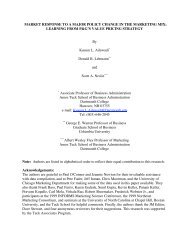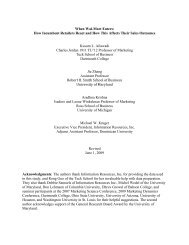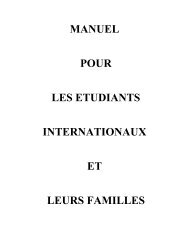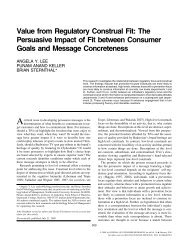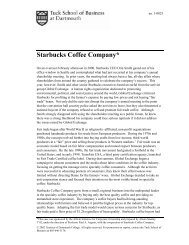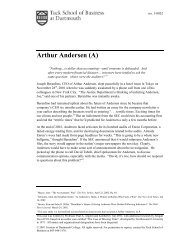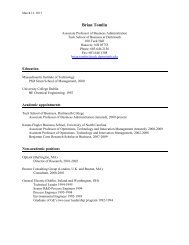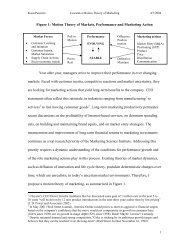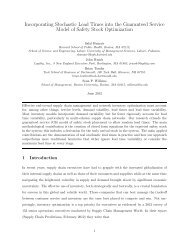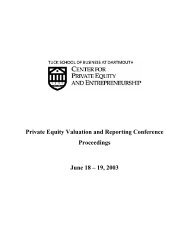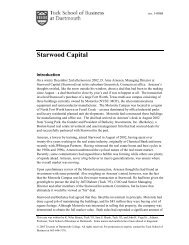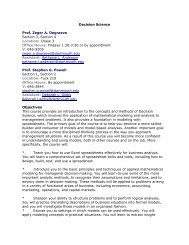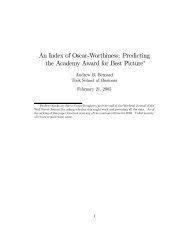tax notes international - Tuck School of Business - Dartmouth College
tax notes international - Tuck School of Business - Dartmouth College
tax notes international - Tuck School of Business - Dartmouth College
You also want an ePaper? Increase the reach of your titles
YUMPU automatically turns print PDFs into web optimized ePapers that Google loves.
INDONESIA<br />
As <strong>of</strong> January 1 and continuing through December<br />
31, 2010, the new rates for the fiscal <strong>tax</strong> are IDR 2.5<br />
million for travel by air and IDR 1 million for travel by<br />
sea.<br />
Indonesian <strong>tax</strong> residents who are 21 years and older<br />
and who have not registered and received a <strong>tax</strong> identification<br />
number (NPWP) are required to pay the fiscal<br />
<strong>tax</strong>, which is creditable against the individual’s income<br />
<strong>tax</strong> payable at the end <strong>of</strong> the year (once the <strong>tax</strong>payer<br />
has obtained an NPWP). The new regulation does not<br />
address the mechanism for crediting fiscal <strong>tax</strong> against<br />
an employer’s income <strong>tax</strong> payable at year-end.<br />
In contrast, <strong>tax</strong>payers who have registered and received<br />
an NPWP are no longer required to pay the fiscal<br />
<strong>tax</strong>. The <strong>tax</strong>payer’s spouse and dependent family<br />
members also will be exempt from the <strong>tax</strong>, provided<br />
that they are listed on the family card (Kartu Keluarga)<br />
<strong>of</strong> the NPWP holder. For families <strong>of</strong> foreign citizens<br />
with an NPWP, the <strong>tax</strong>payer must attach a photocopy<br />
<strong>of</strong> a Certificate <strong>of</strong> Expatriate’s Family Structure or<br />
other <strong>of</strong>ficial document equivalent to the certificate,<br />
indicating the family relationship status.<br />
Exemptions from the fiscal <strong>tax</strong> are granted to foreign<br />
<strong>tax</strong>payers who do not reside in Indonesia or who<br />
stay in Indonesia for no more than 183 days in a 12month<br />
period. Diplomats and representatives <strong>of</strong> <strong>international</strong><br />
organizations and their families, Indonesian<br />
citizens permanently residing abroad, hajj pilgrims, individuals<br />
crossing land borders, Indonesian students<br />
studying abroad, Indonesian workers with migrant<br />
worker cards, and individual <strong>tax</strong> residents with annual<br />
income below the non<strong>tax</strong>able income threshold also<br />
are exempt from the fiscal <strong>tax</strong>.<br />
♦ Firdaus Asikin and Connie Chu,<br />
Deloitte Touche Tohmatsu, Jakarta. Copyright © 2009<br />
Deloitte Touche Tohmatsu. All rights reserved.<br />
Regulation Amends CFC Rules,<br />
Clarifies Export Duty<br />
Indonesia’s Ministry <strong>of</strong> Finance recently issued<br />
Regulation 256/PMK.03/2008 (dated December 31,<br />
2008) revising the previous controlled foreign corporation<br />
rules under Ministry <strong>of</strong> Finance Decree 650/<br />
KMK.04/1994.<br />
The new rules, which entered into force on January<br />
1, no longer contain blacklisted countries; thus, Indonesia<br />
no longer distinguishes between the jurisdictions <strong>of</strong><br />
foreign subsidiaries. Any undistributed pr<strong>of</strong>its <strong>of</strong> unlisted<br />
companies with Indonesian control <strong>of</strong> 50 percent<br />
or more that are incorporated in foreign countries will<br />
be deemed to be distributed if they are not distributed<br />
within four months <strong>of</strong> the most recent submission <strong>of</strong><br />
an annual <strong>tax</strong> return in that foreign country.<br />
If there is no obligation to file an annual <strong>tax</strong> return<br />
in that foreign country, the undistributed pr<strong>of</strong>its will be<br />
deemed distributed if they are not distributed within<br />
seven months after the <strong>tax</strong> year ends.<br />
Distributed dividends received from foreign subsidiaries<br />
are <strong>tax</strong>ed in the normal manner. The ordinary<br />
foreign <strong>tax</strong> credit with a per-country limitation does<br />
not extend to the underlying corporate <strong>tax</strong>.<br />
Like the old CFC regulations, the new rules apply<br />
only to foreign subsidiaries that are directly held by<br />
Indonesian <strong>tax</strong> residents and do not have grandfathering<br />
provisions that extend to foreign subsidiaries indirectly<br />
owned by Indonesian <strong>tax</strong> residents through their<br />
direct foreign subsidiaries acting as mixer companies.<br />
It is unclear whether the CFC rules are still applicable<br />
if the Indonesian shareholder does not have<br />
rights to receive dividends under the relevant laws in<br />
the jurisdiction <strong>of</strong> the foreign subsidiary.<br />
Export Duty<br />
The Ministry <strong>of</strong> Finance also issued Regulation<br />
214/PMK.04/2008 (dated December 16, 2008), which<br />
clarifies Export Duty Regulation 214. Regulation 214,<br />
which entered into force on January 1, implemented<br />
Customs Law 17 <strong>of</strong> 2006 and articles 2(5), 14, and 18<br />
<strong>of</strong> Regulation 55 <strong>of</strong> 2008 concerning the application <strong>of</strong><br />
export duty.<br />
Generally, exported goods are subject to export duty,<br />
with the exception <strong>of</strong>:<br />
• goods owned by foreign missions or their <strong>of</strong>ficials<br />
who are posted in Indonesia, based on the principle<br />
<strong>of</strong> reciprocity;<br />
• goods that are owned and used by museums,<br />
zoos, and similar public places, as well as goods<br />
used for nature conservation;<br />
• goods used in scientific research and development;<br />
• goods that are used as samples and are not for<br />
commercial use;<br />
• belongings <strong>of</strong> individual passengers and carrier<br />
crew members traveling cross-border, and shipments<br />
up to a certain value <strong>of</strong> export duty or in<br />
specified amounts;<br />
• goods that were imported and reexported; and<br />
• exported goods that will later be imported.<br />
To be eligible for the export <strong>tax</strong> exemption, an exporter<br />
must file a written declaration with the head <strong>of</strong><br />
the customs <strong>of</strong>fice reporting goods that fall into the<br />
first four categories mentioned above, and must file an<br />
application with the head <strong>of</strong> the customs <strong>of</strong>fice for the<br />
last two categories <strong>of</strong> goods mentioned above.<br />
The export duty rate is based on a percentage <strong>of</strong> the<br />
export value (ad valorum) or the specific amount <strong>of</strong><br />
the export value. The rate is based on the export value<br />
stipulated on the date the export declaration is filed<br />
with the customs <strong>of</strong>fice.<br />
398 • FEBRUARY 2, 2009 TAX NOTES INTERNATIONAL<br />
(C) Tax Analysts 2009. All rights reserved. Tax Analysts does not claim copyright in any public domain or third party content.



